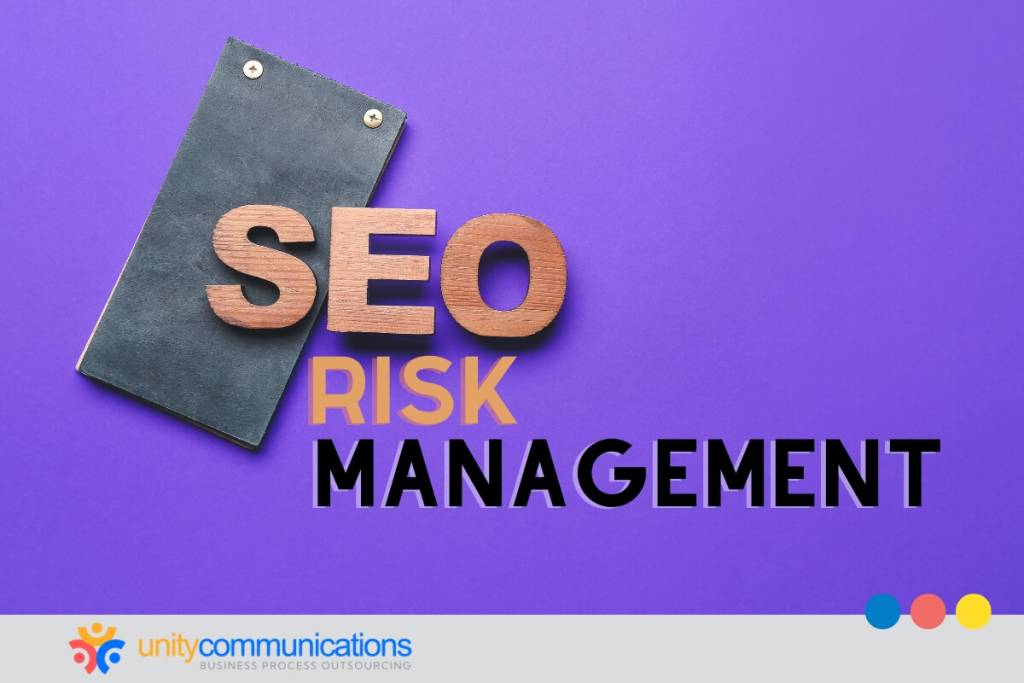IN THIS ARTICLE
Table of Contents
Nowadays, businesses face fierce competition online. Implementing digital marketing strategies such as search engine optimization (SEO) can help them stay ahead.
However, navigating the complexities of SEO involves risks that can affect rankings, visibility, and return on investment (ROI). Business process outsourcing (BPO) firms can provide SEO risk management strategies to safeguard online success and achieve maximum results.
Continue reading to learn more about BPO’s role in preventing SEO risks. This guide also explores practical strategies for leveraging the strategy and future trends.
Understanding SEO risk management

SEO risk management identifies, assesses, and mitigates challenges that could harm a site’s search engine performance and competitive edge. Examples include:
- Algorithm updates
- Search penalties
- Ineffective keyword tactics
- Low-quality backlinks
Proper management maintains a business’s online visibility and search engine rankings while avoiding costly mistakes. By proactively addressing these risks, companies can build a resilient and effective SEO strategy for long-term success.
The role of outsourcing in mitigating SEO risks
Outsourcing provides access to specialized expertise and resources for robust SEO risk management. BPO firms can implement proactive strategies, such as auditing backlinks, optimizing content, and monitoring algorithm changes, to safeguard a website’s rankings.
But what is BPO? It delegates specific business functions to external service providers, allowing businesses to focus on core operations. In SEO, the functions of BPO partners include managing and optimizing search engine strategies.
These providers bring valuable expertise in handling SEO risks, from algorithm updates to link-building strategies, so websites remain competitive and compliant. They also identify and address vulnerabilities that in-house teams might overlook to reduce the likelihood of penalties or performance decline.
With the ability to scale efforts, track performance, and adapt to changes, BPO firms are excellent partners for businesses looking to manage SEO risks and achieve long-term success. Companies can focus on growth while experts manage and execute organic marketing campaigns.
Identifying potential SEO risks and their impacts
Identifying potential SEO risks is crucial for safeguarding a website’s performance and maintaining its visibility in search engine results pages (SERPs). These risks can stem from various factors. Understanding them is the first step toward developing an effective mitigation strategy:
- Algorithm changes: Search engine updates can lead to ranking drops if a website is not optimized for the latest criteria. In 2024 alone, Google Search implemented four core and three spam updates.
- Low-quality backlinks: There is a strong connection between the number of websites linking to a page and its position in search rankings, but not all backlinks are beneficial. Poor or spammy inbound URLs can lead to penalties, undermine a website’s authority, and reduce its visibility in search results.
- Content duplication: Duplicate content can confuse search engines, ranking or displaying outdated content or the page the business doesn’t want to index. Old copy can also hurt the user experience, indirectly influencing search rank.
- Slow page load speed: Desktop websites usually load in about 2.5 seconds, whereas mobile websites take 8.6 seconds. Pages that take longer than these average load times are prone to higher bounce rates, affecting ranking, user experience, and conversion.
- Mobile optimization issues: With 54% of all website traffic coming from mobile phones, Google now prioritizes mobile-first indexing. Unresponsive, poorly designed pages could lose rankings and visibility.
An experienced BPO team proactively manages these SEO risks to help businesses maintain their online presence and competitiveness.
Selecting the right outsourcing partner for SEO risk management
Choosing the right outsourcing partner for SEO risk management is essential for ensuring the long-term success of digital marketing efforts. The BPO firm should have the expertise to handle SEO challenges while aligning with broader strategies and business goals.
Here are factors to consider when choosing a BPO partner for SEO risk management:
- Experience and expertise: Look for a BPO provider with a proven track record in SEO and a deep understanding of search engine algorithms. A knowledgeable partner can anticipate industry changes and implement proactive strategies to safeguard rankings.
- Customized approach: Pick a partner that can tailor SEO strategies based on business objectives and industry-specific requirements. A personalized strategy aligns risk management efforts with unique business goals, maximizing effectiveness.
- Transparency and communication: Choose a partner that values clear communication and provides detailed reports on SEO performance and risk management efforts. Regular updates and open discussions help businesses stay informed and make data-driven decisions.
- Reputation and reviews: Ask for client testimonials and case studies to assess the provider’s success in delivering results and managing SEO risks. A well-reviewed partner with a history of success demonstrates reliability and trustworthiness.
- Scalability: Select a partner to accommodate business growth and adapt strategies to SEO changes. A scalable BPO provider ensures long-term success by adjusting strategies as digital landscapes shift and business needs expand.
By collaborating with the right BPO team, businesses can confidently navigate SEO and drive sustainable online success.
Integrating risk management into existing SEO strategies

Integrating risk management into existing SEO strategies is essential for maintaining a website’s performance and protecting it from potential penalties. With the constant changes in search engine algorithms and best practices, this step safeguards rankings and online visibility.
The following are ways third-party SEO professionals can integrate risk management strategies into existing SEO campaigns:
- Continuous monitoring: BPO firms track search engine algorithm updates and adjust strategies to stay compliant. Staying ahead of changes helps businesses avoid unexpected ranking drops and maintain long-term SEO stability.
- Regular audits: They conduct in-depth SEO audits to identify vulnerabilities, such as toxic backlinks or duplicated content. These audits provide actionable insights that help businesses proactively address issues.
- Penalty prevention: By adhering to best SEO practices, BPO teams can implement preventive measures to avoid penalties. This includes complying with Google’s guidelines, optimizing website structure, and maintaining high-quality content to prevent algorithmic or manual penalties.
- Performance tracking: They provide ongoing SEO performance analysis and adjust tactics in real time to minimize risks and enhance results. Continuous evaluation fine-tunes business strategies to effectively respond to emerging opportunities or threats.
- Scalability and flexibility: BPO firms offer scalable solutions that evolve with SEO trends so strategies remain competitive.
Partnering with a BPO firm allows businesses to implement risk-proof SEO strategies to sustain success, minimize operational disruptions, and boost conversions and returns.
Monitoring and measuring risk management effectiveness
Monitoring and measuring risk mitigation strategies can determine whether SEO campaigns work and potential threats are managed effectively. Without regular tracking and adjustments, businesses might miss opportunities or fail to identify emerging problems.
BPO partners apply data-driven approaches to assessing risk mitigation efforts through the following:
- Performance analytics: BPO partners utilize advanced tools to track key SEO metrics, such as rankings, organic traffic, and engagement, to assess the impact of risk mitigation efforts. By analyzing these metrics over time, they can identify trends, detect potential risks, and refine strategies to enhance SEO performance.
- Real-time reporting: They provide regular reports with actionable insights, allowing businesses to adjust strategies promptly. These reports highlight successes, pinpoint weaknesses, and suggest data-backed improvements to maintain a competitive edge.
- Risk heatmaps: BPO firms create visual representations of high-risk areas and track mitigation progress. These heatmaps help businesses prioritize urgent threats and allocate resources efficiently to safeguard SEO performance.
- A/B testing: This method compares versions of SEO management tactics to determine which delivers the best possible results. It informs business decisions based on real-world data, optimizing their SEO strategies for maximum impact.
- Competitor analysis: BPO partners monitor competitors to identify emerging trends and adjust risk management strategies accordingly. By understanding competitors’ strengths and weaknesses, businesses can proactively refine their tactics to stay ahead.
With BPO support for monitoring and measuring risk mitigation, businesses can ensure that their SEO efforts remain effective and adaptive to changes.
Addressing challenges in outsourcing SEO risk management
Outsourcing SEO risk management strategies can offer significant benefits, but it also comes with unique challenges that businesses must address to maintain successful outcomes. From communication issues to difficulties in aligning strategies, they can harm the effectiveness of risk management efforts.
Examples include:
- Lack of alignment with business goals: BPO partners might not fully understand the specific needs or objectives of the business, leading to mismatched SEO strategies. Clear communication and measurable goals align BPO teams with business objectives.
- Communication barriers: Remote collaboration can create communication challenges, leading to misunderstandings or delays in implementing risk management strategies. Scheduling consistent meetings to discuss progress, address concerns, and keep strategy on track can prevent communication issues.
- Quality control issues: When working with an external team, maintaining quality in SEO practices might be difficult. Businesses must carefully vet BPO partners to ensure they have the expertise, reputation, and security measures.
- Data security concerns: Sharing sensitive information with a third-party team can raise privacy and security risks if mishandled. Companies must implement secure methods when sharing sensitive data.
- Inconsistent reporting: Some BPO providers might fail to deliver timely or comprehensive reports, hindering the ability to monitor and adjust strategies effectively. Companies must set expectations for regular, detailed reports to monitor performance and make adjustments as needed.
Businesses can optimize their outsourcing efforts and achieve better SEO risk management outcomes by proactively addressing challenges.
Legal and ethical considerations in SEO risk management
Legal and ethical considerations are crucial to SEO risk management, as non-compliance with search engine guidelines or legal regulations can result in penalties or damage to a brand’s reputation. Without careful oversight, unethical tactics such as black-hat SEO or misleading content can lead to long-term harm.
Partnering with an experienced BPO firm mitigates these risks by following industry standards and complying with relevant laws and guidelines.
An experienced BPO partner ensures:
- Adherence to search engine guidelines: Follow Google’s Webmaster Guidelines and other search engine rules to avoid SEO penalties.
- Ethical link building: Focus on acquiring high-quality, relevant backlinks through ethical and sustainable methods. They avoid black-hat techniques, such as cloaking, keyword stuffing, and hidden links.
- Transparent reporting: Provide comprehensive, honest reports about SEO efforts to create a paper trail and show businesses their commitment to risk management.
- Data privacy compliance: Adhere to federal and international data privacy laws, such as the EU’s General Data Protection Regulation (GDPR). They also implement industry-specific rules, such as the Health Insurance Portability and Accountability Act of 1996 (HIPAA).
Businesses can manage SEO risks by working with a responsible BPO partner while adhering to legal and ethical standards.
Future trends in SEO risk management and outsourcing

As the digital landscape evolves, businesses must stay ahead of emerging trends to keep their SEO risk management strategies practical and compliant with changing search engine guidelines.
What changes can they expect? Here are some examples:
Proactive risk mitigation
Artificial intelligence (AI) will be more significant in forecasting potential SEO risks by analyzing large volumes of data, including search engine changes, competitor activities, and industry trends.
Advanced dashboards will offer immediate insights into website performance, SERP changes, and competitor actions, with automated alerts to flag any significant ranking drops or unusual behavior. SEO audits will go beyond technical aspects, focusing more on brand reputation, user experience, and adherence to ethical standards to ensure long-term viability.
Shifting outsourcing trends
Outsourcing will increasingly incorporate AI-driven platforms for keyword research, content improvement, and competitor analysis to streamline processes and reduce costs. Businesses will prefer partnering with agencies specializing in specific areas of SEO, such as e-commerce, local or international, rather than generalist agencies.
The growing remote work trend will allow companies to tap into a global talent pool, gaining access to specialized expertise and cost-efficient solutions worldwide.
User experience (UX) focus
SEO will become more closely linked with UX as search engines increasingly prioritize such a signal. This will make target audience satisfaction essential for rankings and conversions.
With the rise of voice assistants, optimizing websites for conversational questions and natural language will become more critical. Mobile-first indexing will remain key, requiring sites to be fully responsive and deliver a smooth experience across all devices.
Commitment to ethical SEO and transparency
Ethical SEO practices will gain further attention, emphasizing producing high-quality content, fostering authentic relationships, and avoiding black-hat tactics. Earning trust from search engines and users will be essential, with clear communication and transparent reporting playing a vital role in SEO success.
Continuous learning and adaptation
SEO evolves. Businesses must remain agile and continuously learn about new algorithms, technologies, and user behaviors. Analyzing data will be crucial for evaluating campaign effectiveness, identifying areas for improvement, and informing decisions.
The bottom line
Outsourcing SEO risk management strategies allows businesses to tap into specialized expertise and advanced tools to reduce potential penalties and comply with search engine guidelines. By partnering with experienced BPO firms, companies can proactively identify and address SEO challenges and enhance their online presence.
Ready to optimize your SEO strategy? Outsource your SEO today! Let’s connect.





